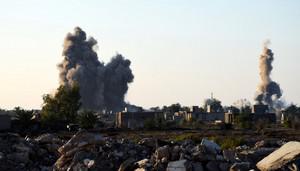ISISLoss of territory contributes to significant drop in ISIS funding
Islamic State’s income has more than halved since 2014, due to its shrinking territory in Syria and Iraq and subsequent losses of significant sources of revenue, according to a new study. Whilst it is impossible to say exactly how much money Islamic State has at its disposal, findings show that the most significant sources of revenue are closely tied to the territory it controls. Most recent evidence suggests that total income from taxes/extortion, oil, kidnapping, antiquities, looting, and confiscations has decreased from up to $2 billion in 2014 to less than $800 million in 2016. There is also no evidence that the group has been successful in creating new sources of revenue.

Ramadi during its recapture by the Iraqi military // Source: theconversation.com
Islamic State’s income has more than halved since 2014, due to its shrinking territory in Syria and Iraq and subsequent losses of significant sources of revenue, according to a collaborative new study by the International Centre for the Study of Radicalization (ICSR) at King’s College London and EY.
Whilst it is impossible to say exactly how much money Islamic State has at its disposal, findings show that the most significant sources of revenue are closely tied to the territory it controls. Most recent evidence suggests that total income from taxes/extortion, oil, kidnapping, antiquities, looting, and confiscations has decreased from up to $2 billion in 2014 to less than $800 million in 2016. There is also no evidence that the group has been successful in creating new sources of revenue.
KCL says that in collaboration with EY’s Fraud Investigation & Dispute Services team, researchers at the ICSR conducted in-depth interviews with officials and experts, reviewed dozens of public statements, internal ISIS documents, parliamentary testimonies, and think tank, government and media reports detailing Islamic State finances.
As well as shrinking territory, the researchers suggest that ISIS’s economic model has relied heavily on “relentless” territorial expansion to fine populations and seize assets. The report cites ISIS internal documents which suggest that $3.7m was raised in one month in 2015 through confiscations in Syria’s Deir ez-Zor province but since then, these non-renewable revenue sources appear to make up an increasingly small proportion of its finances.
The report also highlights the significance of the ongoing battle to reclaim Mosul from Islamic State. In addition to constituting a military and symbolic defeat, losing control of the city would have large financial repercussions for Islamic State. The Iraqi city is the commercial capital of its proto-state. As a result, the report suggests that if Mosul is re-taken in its entirety, it will likely be a water-shed moment in Islamic State’s financial prospects.
Subsequent action by The Global Coalition to Counter ISIL, such as the launch of Operation Tidal Wave II in October of 2015, has also been pivotal in destroying the infrastructure and key transportation systems integral to the Islamic State’s financial fortunes.
